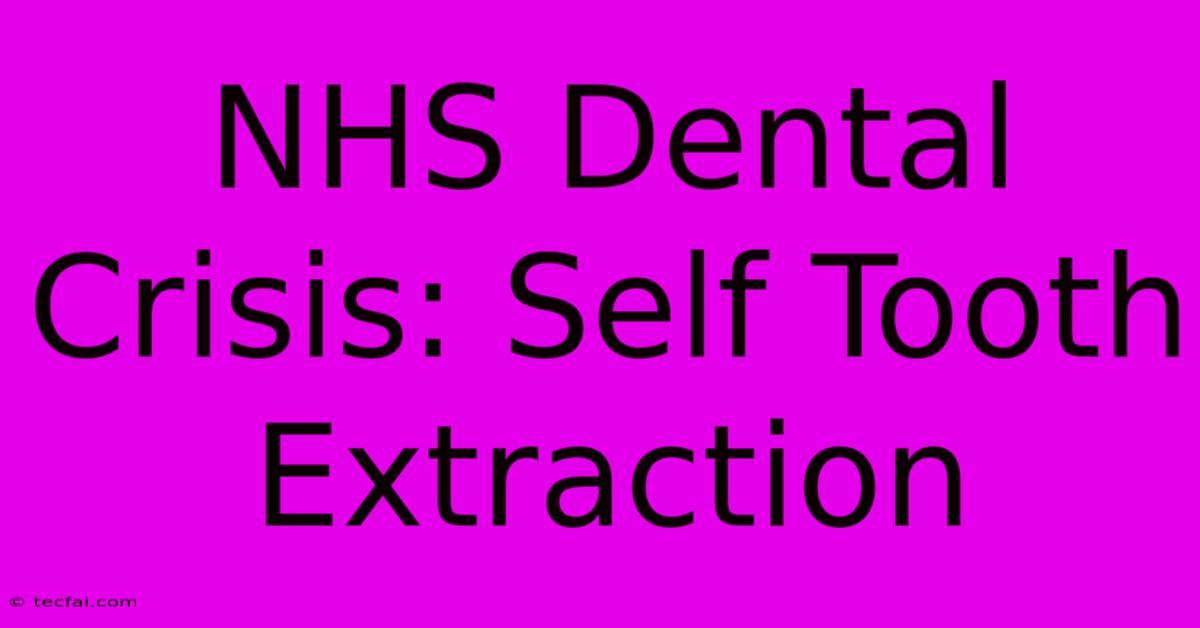NHS Dental Crisis: Self Tooth Extraction

Discover more detailed and exciting information on our website. Click the link below to start your adventure: Visit Best Website tecfai.com. Don't miss out!
Table of Contents
NHS Dental Crisis: The Perilous Rise of Self-Tooth Extraction
The UK is facing a significant NHS dental crisis. Access to affordable and timely dental care is dwindling, leaving many with no option but to endure excruciating pain or, tragically, resort to drastic measures like self-tooth extraction. This alarming trend highlights a failing system and poses serious health risks.
The Dire State of NHS Dentistry
Years of underfunding and poor policy have created a perfect storm in NHS dentistry. Long waiting lists, capped NHS treatment, and a shortage of dentists, particularly in underserved areas, mean countless individuals are left struggling to find adequate care. This isn't simply an inconvenience; it's a public health emergency. The consequences are far-reaching, impacting oral health, overall wellbeing, and even leading to potentially life-threatening complications.
Why People Resort to Self-Extraction
The desperation of those unable to access NHS dental services is palpable. Faced with unbearable pain, infection, and the inability to afford private care, some individuals take matters into their own hands. This is a dangerous and ill-advised act, driven purely by a lack of viable alternatives. The reasons behind this alarming trend are multifaceted:
- Unaffordable Private Treatment: The cost of private dentistry can be prohibitive, leaving many with no option but to suffer in silence or attempt self-extraction.
- Unacceptably Long Waiting Lists: The length of time people wait for NHS appointments often surpasses the threshold of tolerable pain, leaving them with no choice but to seek immediate – albeit risky – solutions.
- Geographic Disparities: Access to NHS dental services is incredibly uneven, with some areas experiencing far greater shortages than others, exacerbating the problem for those in remote or deprived communities.
- Lack of Awareness: Many are unaware of alternative support services or options that might mitigate the crisis, leading them to believe self-extraction is their only recourse.
The Dangers of DIY Dentistry
Self-tooth extraction is incredibly dangerous and should never be considered. The risks are substantial and include:
- Infection: Improper extraction significantly increases the risk of severe infection, potentially leading to sepsis, a life-threatening condition.
- Excessive Bleeding: Uncontrolled bleeding can be difficult to manage without professional medical intervention.
- Damage to Adjacent Teeth: Attempting to remove a tooth at home can easily damage surrounding teeth and gums.
- Jaw Fracture: Incorrect extraction techniques can result in jaw fractures requiring extensive surgical repair.
- Nerve Damage: Damage to nerves can lead to long-term numbness or pain in the mouth, jaw, and face.
Seeking Help: Alternatives to Self-Extraction
While the NHS dental crisis is real and deeply concerning, self-extraction is never the answer. Individuals facing dental problems should explore these alternatives:
- Contact your local NHS dental practice: Even if waiting lists are long, making contact is vital. Explain your situation and inquire about emergency appointments or urgent care options.
- Seek advice from a local dentist: Many dentists offer emergency consultations, even if they don't accept NHS patients. While potentially costly, a consultation can offer crucial advice and guidance.
- Explore dental charities: Various dental charities offer support and advice to those struggling to access dental care. Research organizations in your area that can potentially assist you.
- Contact your GP: Your GP can provide advice and potentially refer you to relevant services or dental professionals.
The Need for Systemic Change
The self-extraction trend is a stark warning of the failings within the NHS dental system. Addressing this crisis requires a multifaceted approach involving increased funding, improved access, and a renewed focus on preventative care. Without significant systemic change, we can expect to see a continued rise in individuals taking matters into their own hands, putting their health and lives at risk. This isn't just about fixing teeth; it's about addressing a fundamental issue of healthcare access and equity. The government and NHS must prioritize solutions before more people suffer the devastating consequences of this crisis.

Thank you for visiting our website wich cover about NHS Dental Crisis: Self Tooth Extraction. We hope the information provided has been useful to you. Feel free to contact us if you have any questions or need further assistance. See you next time and dont miss to bookmark.
Featured Posts
-
Cavan Emergency Department Overwhelmed
Dec 03, 2024
-
Global Role For Sentiers Apac Head
Dec 03, 2024
-
Seven Years Womans Last Resort For Dental Care
Dec 03, 2024
-
Shakeup In First Sentier Leadership Team
Dec 03, 2024
-
Prebble On Nzs Fiscal Challenges
Dec 03, 2024
